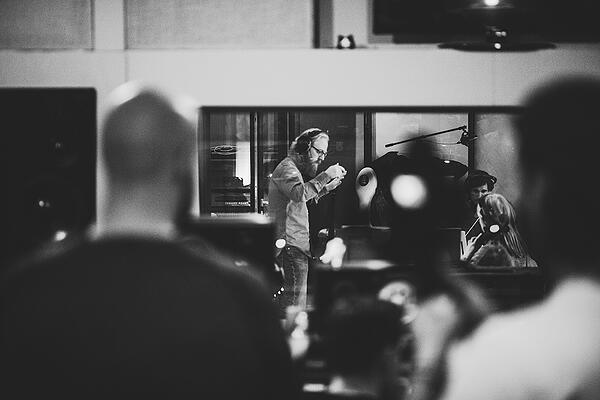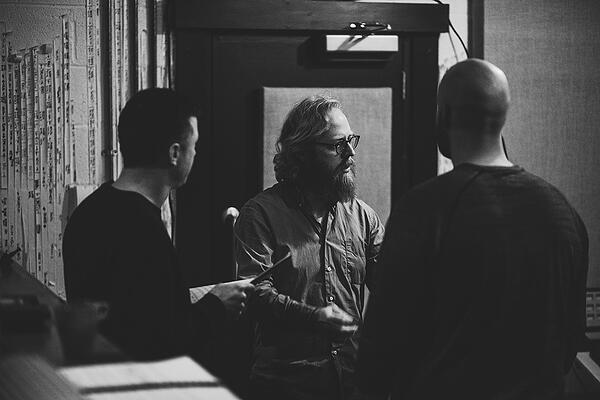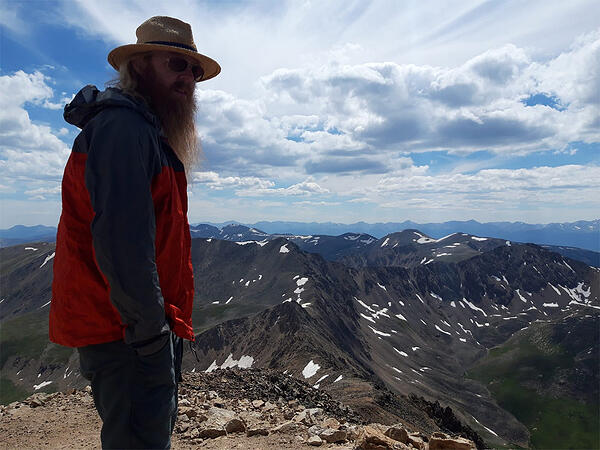Last year, composer Drew Morgan visited dBs Institute to offer his insight into the world of game audio, specifically his work on Halo 4. Poised to return once again and deliver another masterclass on the subject, we joined Drew to see what he's been up to and ventured deeper into how he first found success as a composer.
It’s been a year since we last spoke with you Drew, what have you been up to these past 12 months?
Quite a lot of different things, as ever. Arranging and orchestration for TV series and album tracks, including Britannia (Sky Atlantic), 7 Days to the Moon (BBC), as well as some concerts including Glastonbury and WOMAD for the first time. Those are the headlines, but also a lot of smaller recording sessions, arrangements for bands, sample libraries etc. that keep it all interesting.
You’ll soon be returning to deliver another guest lecture. What can our students expect to see?
I try and give insight to the process of writing rather than just showing off nice-sounding finished tracks. It can be disheartening when you start something new if you are only ever comparing it to finished tracks, so I think it is important to show the steps.
We previously spoke at length about your journey as a composer but would love to hear more about your early days in the audio industry. What was your first music-related job?
Probably working in a record store! Then I did demo sessions for the notation software Finale while studying in London. From there little things like the odd concert or small short film might have given me a few pounds here and there, but the first commission was from a dear friend and artist who asked me to score an art film he was making.
I was just reminiscing about it because it was the first thing I recorded at Angel Studios, which I’ve just heard is closing its doors. Incredibly sad to hear that. I had no idea what I was doing when writing that score - I studied classical composition, not scoring, so was figuring out the technical things as I went!

You’ve previously said that the majority of your portfolio has been through word of mouth. Was this still the case when landing your first job?
It was. A big part of getting a job in this industry is trust. Established composers will feel trustworthy to clients because they have a track record and reputation, but when starting out you have to convince people that you’ll be reliable, creative and a good person to work with.
That can be done by creating as much good work as you can to show you are capable, but also by building a network of people around you who might throw you work if they get a break. Uni is great for this - your classmates will become your colleagues.
What unexpected challenges did you face when first starting out and what steps can aspiring composers take to anticipate them?
I’m struggling with this one because every career is fairly unique. There isn’t a general path into having a career so everyone runs into different roadblocks. Paying rent is always a hard one at first, so finding jobs related to the industry though not perhaps your dream job at least keep you learning things. As I said before, I did some demo work for Finale and also did a bit of guest teaching. I also lived extremely cheaply for years so I could focus on making music, regardless if I was getting paid or not.
You owe a lot of your early success to the people you’ve met along the way. What advice would you give to the next generation of creators to build that professional network?
Be helpful and be someone who makes a situation better. This is true in life, and what makes the world go around and places like Bristol are a great place in my experience.
Know someone who is putting out a record, but the mix sucks and they have no budget? Help them. In a fancy studio and you notice there are empty coffee mugs around? Clean them up. In a shop and see an old lady who can’t reach something? Help her.
Be someone who adds value to other people’s work and makes any situation better. I see some younger folk trying to big up their ego by trying to prove they are above doing certain things. Get over your ego and focus on making things better.

What non-musical tool has been the most invaluable to you during your career?
My hiking boots. It is very easy to get our heads so deep into projects that it hurts our health. Exercise is super important for basic physical health, obviously, but massively for stress, anxiety etc. I’m not a gym guy at all, but what a bit of time in nature does for my head and soul is incredible. Music and art reflect real life and nature, so if we’re not out there, we’re losing touch.

You’ve spoken about unexpected challenges, but I wanted to ask what challenges exist now in the audio industry that didn’t when you first began?
Hard to say because I don’t feel like I have a good view of “the industry” as such. Things are always in flux and the places we can find work are perhaps more varied. Big studio complexes are closing down as we seem to be heading towards being more of a cottage industry. More and more people are working out of their own private studios, often in their own homes. Connecting to other creatives is both easier than ever (social media) and harder (real-life physical spaces).
Do you know how those challenges can be overcome for the next wave of people looking to find work?
If you connect with someone online, try and meet up in person if you think it is a good connection. And not with the aim that they might give you work the next day, but simply to build a human, non-digital network.
What’s been the most important lesson you’ve learned during your time working in this field?
Work brings in more work. People want to hire folks who are making things, not those who say they could. And I don’t mean paid work, I mean things you make and share with the world.
Finally, you already shared your advice for what students can do to pursue a career in composition, so I wanted to ask what they should avoid doing?
Don’t be too proud to ask friends for help. Nobody is an expert in everything. Yes, learn everything you can, but ask for help when you need it.
FIND OUT MORE
andrewmorgan.org
twitter.com/morgannoise


.jpg?width=300&name=Drew%20Morgan%20(Featured%20Image).jpg)